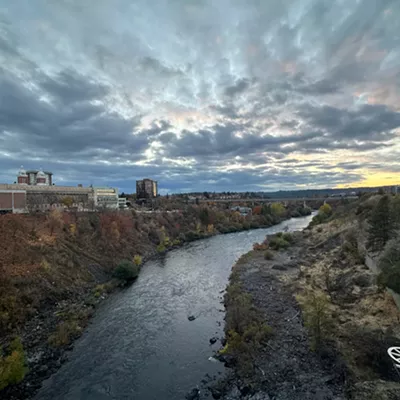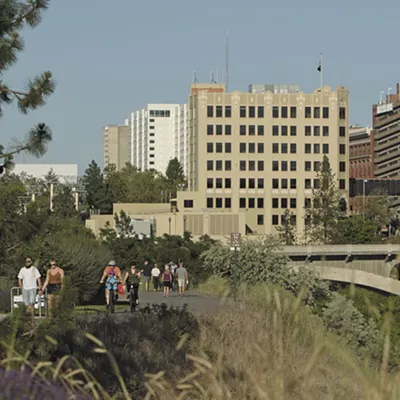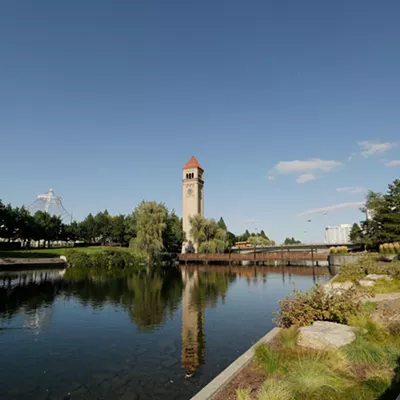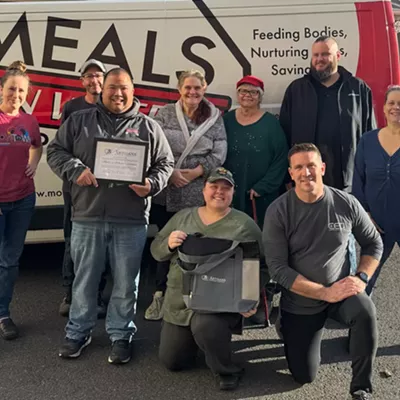When the longtime head of the Spokane Riverkeeper organization — Jerry White Jr. — retired earlier this year, the environmental group shifted to a new model of leadership.
Jule Schultz and Katherine Thompson will serve as the waterkeeper and managing director respectively. And Katelyn Scott, the third member to the leadership team, will be the Spokane Riverkeeper's first water protector.
Scott grew up in Wellpinit and has a degree from Loyola University Chicago School of Law, focusing on public interest and environmental law.
We sat down with Scott to talk about the river's worst polluters, the tribal effort to reintroduce salmon to the region's waterways, and what the river will look like in 50 years.
This article has been edited and condensed for clarity.
INLANDER: Why did the organization shift to a team-led model, and what will you do as the water protector?
SCOTT: In the process of replacing Jerry, the board and hiring committee decided that it would be beneficial to the organization to add a person who specializes in law and policy.
My counterpart is Jule, who leads our community science and community outreach program. He'll be doing a lot of the on the river fieldwork stuff, and I get to spend most of my time in the office doing the legal work. And then the third leg is Katie, our managing director, who will do all the behind the scenes stuff.
I'll run our Clean Water Defense and our River Flow Protection Program. We'll do things like implementing policies [like the Clean Water Act] and working with the city to try and conserve water and create policies that help conserve water and protect our river, but also enforcing the Clean Water Act by policing the polluters and ensuring they're complying with their permits.
What are some of the first things that you'll do in your new role, and what are some long-term things that you're hoping to work on?
More immediately, I'm hoping to work with the city on the water conservation law and close the loophole that exempts the city from that ordinance, because they're the biggest consumers. On a more long-term basis, I'd love to see a Rights of Nature campaign happen here, where our river actually has its own legal voice and we can start giving it its own rights again.
Could you tell me a little bit about issues you're currently monitoring?
A lot of our work right now is going to be stormwater-related, because that's just a big issue statewide right now. We're working on the water conservation law and trying to find ways to actually enforce it. Right now, the city of Spokane is exempt from that law. We'd like to see them change their position and actually follow it themselves. They are the biggest water consumer in the area.
A lot of work has been done to improve the health of the river. What is there left to do?
We have seen some improvements, but there's a huge dissolved oxygen issue down at Long Lake Dam. You still see those huge algae blooms at Long Lake Dam and on the Little Spokane. We still have a huge phosphorus problem and a sediment problem with Hangman Creek. And then we're still battling with these permit holders to actually keep the toxins out of our river. The city has done quite a bit to install new systems that remove up to 99% from the wastewater system, but there are other polluters that are still putting PCBs [carcinogenic chemicals] into our river.
Are PCBs still the biggest threat to the river?
PCBs are the biggest one right now. Dissolved oxygen is still a really big issue. Temperature is technically a pollutant, and we're very concerned about the temperature of our river, especially with the effects of climate change on our river. One that's kind of in the peripheral that we're not sure about yet would be the PFAS, the forever chemicals. We don't even know if they're in the river yet. We're still monitoring that and seeing if that's a concern.
How would you go about figuring out if PFAS is a concern in the Spokane River?
This is where it falls into Jule's boat. He will investigate if there are studies that can be done, if there's ways that we can detect it. And if they are there — if it's testable, if it's something we can afford to test for — we will see if we can identify where in our river it's coming from.
Is the Riverkeeper working with the Spokane and Coeur d'Alene tribes on salmon recovery?
We fully support the tribes' missions to get more salmon to the river. We work very closely with the Spokane Tribe and the Coeur d'Alene. We're helping the Coeur d'Alene Tribe with their fishery on Hangman Creek. The facility that they're developing is really cool. It's going to essentially clean the water. The water they're going to be discharging is cleaner than what they're taking in, which is not usual. Fish hatcheries are usually big polluters.
What do you envision the Spokane River looking like in the next 10 years? In 50 years?
I think in the next 10 years, I would just like to see a greater respect for our river. It's already very well respected in our area, but more respected in the sense that people actually understand where their water comes from and what it means to use water in our area. Fifty years from now I'd love to see the fish back in the river. I think that's totally doable, maybe not to the historical levels and those 80-pound salmon, but I think we could see fish back in a river and see a more vibrant, redband trout population and be a fly fishing haven more than we already are. ♦

























